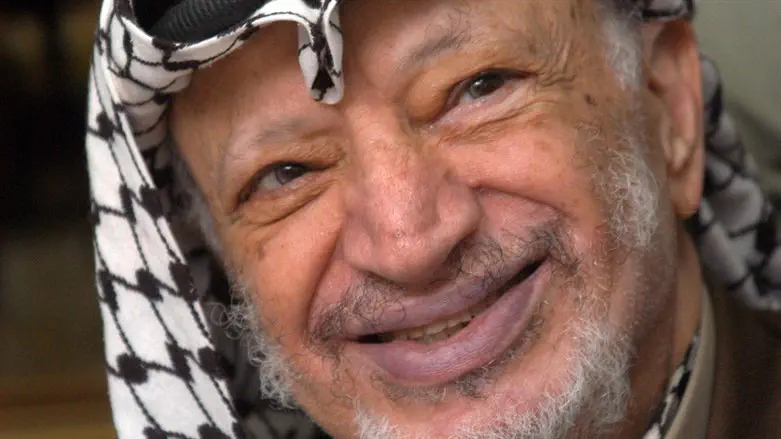
Hundreds of documents have been leaked to social media in recent days including testimonies by senior Palestinian Authority (PA) officials to the commission of inquiry established in 2010 to probe the death of former PA chairman Yasser Arafat, Kan 11 News reported Friday.
The person who led the probe was Fatah senior official Tawfik Tirawi, and its results were never made public. The Al-Araby Al-Jadeed newspaper on Friday quoted PA security sources who said that "Palestinian security mechanisms have launched an investigation to find out who is responsible for the leaking of the documents."
Tirawi himself admitted in recent days that the documents were leaked and added that "the documents remained secret to maintain the integrity of the investigation until the full truth is discovered." According to the documents, during the investigation, 302 people were summoned to testify about Arafat's death. From the testimonies in the leaked documents, it emerged that relations between Arafat and his successor as PA chairman, Mahmoud Abbas, were tense in the period before Arafat’s death.
According to one of the testimonies quoted by Kan 11 News, Arafat turned to Abbas and asked him for assistance in lifting the Israeli blockade of the Mukataa in Ramallah, to which Abbas replied, "He who gets into trouble should know how to get out of it", a reference of Arafat's support for the intifada.
Arafat's former advisor said in his testimony that he believes that "Arafat was killed and did not die a natural death" and mentioned that he met with a senior French intelligence officer in Paris who informed him that Arafat was in a coma and was brain dead.
The testimony of the current PA cabinet leader, Mohammad Shtayyeh, was also leaked. In it, he said that "everyone who serves Israel - has an interest in killing Arafat, such people are in the Palestinian arena."
Abbas’ spokesman, Nabil Abu Rudeineh, said in his testimony that "the international community withdrew its support for Arafat. The former president of Egypt, Hosni Mubarak, was the last Arab leader to contact him and said that the conversation was being recorded and that he should hand over power."
Abu Rudeineh also said in his testimony that he believes that "Arafat was poisoned by a person who served him coffee or tea, he did not protect himself from others and used to trust people, there were hundreds and maybe thousands who gave Arafat gifts and food."
The commander of Arafat's presidential guard also stated in his testimony that he believes that Arafat was poisoned, and mentioned an incident in which a delegation of 300 residents from the village of Salfit visited him, and that Arafat fell ill after that visit and remained ill until the day he died.
The former chairman of the Palestinian Legislative Council, Rawhi Fattouh, said in his testimony that the French doctors who treated Arafat informed the Palestinian Arab delegation that came to visit him at the Paris hospital that "a test was done to identify all types of poisons known to us, but these were not detected during the test." Fattouh added that the delegation was convinced that Arafat was poisoned, and that "the Palestinian Ministry of Health tried to contact the French to get the results of the test but to no avail."
Arafat died in Percy military hospital near Paris aged 75 in November of 2004 after developing stomach pains while at his headquarters in Ramallah.
His widow Suha lodged a complaint at a court in France in 2012, claiming that her husband was assassinated, sparking an inquiry.
The same year, Arafat's tomb in Ramallah was opened for a few hours, allowing three teams of French, Swiss and Russian investigators to collect around 60 samples.
Suha Arafat allowed investigators to exhume her husband’s body after traces of polonium-210 were found on clothing that she provided to scientists as part of an Al Jazeera documentary.
Following the investigation by the Swiss team, PA officials were quick to say that the findings proved that Arafat had been “assassinated” and, as expected, blamed Israel for the “assassination.”
In 2015, French judges closed an investigation into claims Arafat was murdered, without bringing any charges. The French court of appeal upheld the dismissal of the case, leading his widow and daughter to take their case to the ECHR.
(Israel National News' North American desk is keeping you updated until the start of Shabbat in New York. The time posted automatically on all Israel National News articles, however, is Israeli time.)
